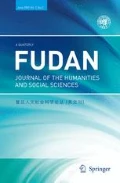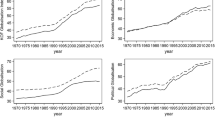Abstract
In his paper “Nationalism, Egalitarianism and Global Justice”, Su Gu extends luck egalitarianism to the debate on global justice in an unconventional way. He invokes luck egalitarianism not to support global egalitarianism, as is commonly the case, but to push back against it. Qingping Liu’s paper, “Global Justice as the Bottom Line: Equal Needs or Equal Rights?”, is also unorthodox [both papers are published in this journal (forthcoming)]. Running against one current in global justice, Liu argues that there is no duty of global justice to meet basic needs and that, moreover, global redistributive policies for the purpose of satisfying needs are generally unjust. Although Liu and Gu provide different arguments for their conclusions, they both believe that global redistributive demands unfairly impose on those who are expected to contribute. My aim in this brief commentary is to try to situate these papers within the global justice literature and to raise some questions that they provoke.
Similar content being viewed by others
Notes
See Simon Caney, Justice Beyond Borders (Oxford: Oxford University Press, 2006) for just one example.
See Darrel Moellendorf, Cosmopolitan Justice (Boulder, CO: Westview Press, 2001); Charles Beitz, Political Theory and International Relations, (Princeton: Princeton University Press, 1999 [2nd ed]), Part III. While Beitz draws on luck egalitarianism in his argument for a redistributive principle to counter the arbitrariness of the distribution of natural resources, his argument for global egalitarianism ultimately turns on the idea that the global order constitutes a system of social cooperation.
See Elizabeth Anderson, “What is the Point of Equality?” Ethics 109/2 (1999): 287–337; and Samuel Scheffler, “What is Egalitarianism?” Philosophy and Public Affairs 31/1 (2003): 5–39. I try to defend luck egalitarianism against objections and maintain its plausibility as a grounding for global egalitarianism in Tan, “Luck, Institutions, and Global Distributive Justice: A defense of Global Luck Egalitarianism”, The European Journal of Political Theory 10/3 (2011): 394–421.
Although distinctive, Gu’s position will remind readers of one of John Rawls’s considerations against global egalitarianism in Rawls, The Law of Peoples (Cambridge, MA: Harvard University Press 1999), pp. 117–118.
See Henry Shue, Basic Rights (Princeton: Princeton University Press 1999 [2nd ed.]) for an early and influential argument. See Beitz’s observation that in the contemporary Anglo-American literature, at least since Rawls’s The Law of Peoples, there is a “virtual consensus that wealthy societies have at least minimal economic duties to assist less developed ones”. Beitz, “Fifty Years of Global Justice,” in this volume (ms 9).
References
Anderson, E. 1999. What is the Point of Equality? Ethics 109(2): 287–337.
Beitz, C. 1999. Political Theory and International Relations. 2nd ed. Princeton: Princeton University Press.
Beitz, C. forthcoming. Fifty years of global justice. Fudan Journal of the Humanities and Social Sciences.
Caney, S. 2006. Justice Beyond Borders. Oxford: Oxford University Press.
Gu, S. forthcoming. Nationalism, egalitarianism and global justice. Fudan Journal of the Humanities and Social Sciences.
Liu, Q. forthcoming. Global justice as the bottom line: Equal needs or equal rights? Fudan Journal of the Humanities and Social Sciences.
Moellendorf, D. 2001. Cosmopolitan Justice. Boulder, CO: Westview Press.
Rawls, J. 1999. The Law of Peoples. Cambridge, MA: Harvard University Press.
Scheffler, S. 2003. What is Egalitarianism? Philosophy & Public Affairs 31(1): 5–39.
Shue, H. 1999. Basic Rights. 2nd ed. Princeton: Princeton University Press.
Tan, K.-C. 2011. Luck, Institutions, and Global Distributive Justice: A defense of Global Luck Egalitarianism. The European Journal of Political Theory 10(3): 394–421.
Author information
Authors and Affiliations
Corresponding author
Rights and permissions
About this article
Cite this article
Tan, KC. Global Justice, Luck, and Human Needs: Reflections on Gu and Liu. Fudan J. Hum. Soc. Sci. 12, 255–261 (2019). https://doi.org/10.1007/s40647-019-00251-9
Received:
Accepted:
Published:
Issue Date:
DOI: https://doi.org/10.1007/s40647-019-00251-9




